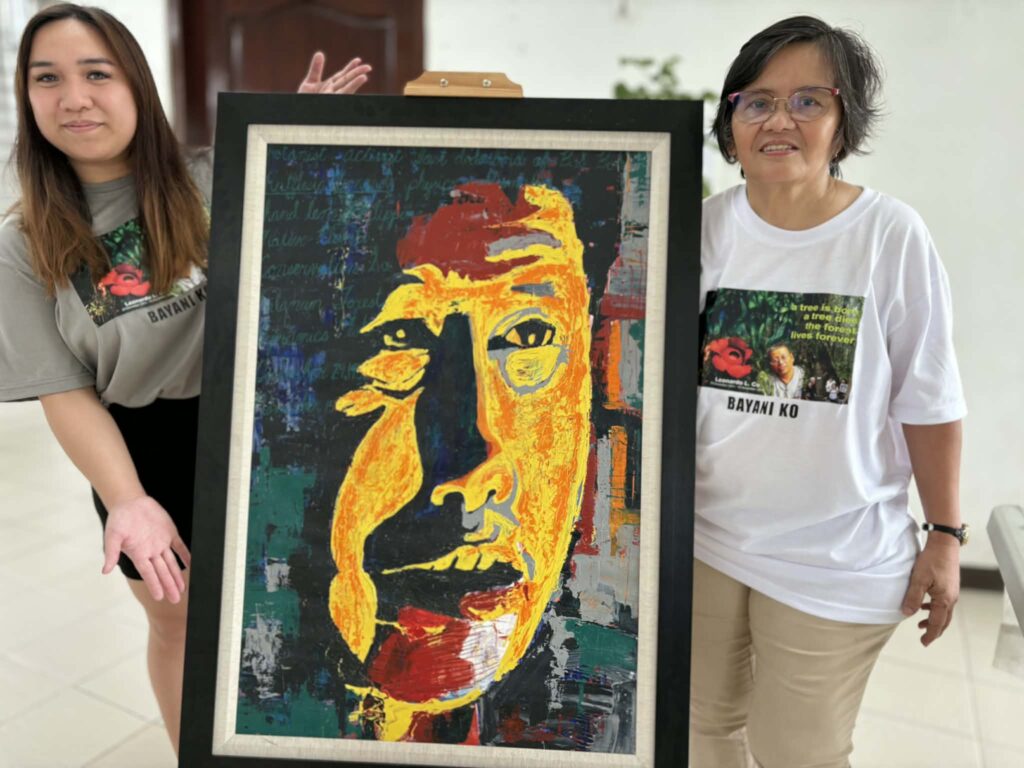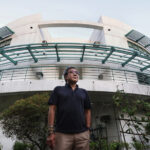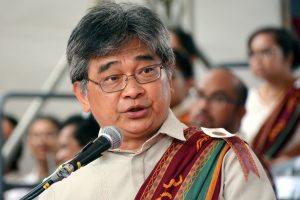
Linnea Co and Glenda Co stand beside a powerful portrait of the late Leonard Co — a scientist, botanist, and environmental defender whose legacy continues to inspire generations. (Photo by Constantino Foundation)
Here’s an antidote to the buffoonery we encounter in the news today, no thanks to politicians in the national spotlight.
Regarding the Joy of Learning
Red Constantino
Managing Director, Constantino Foundation
Much has been said recently about Leonard Co, the celebrated botanist who was murdered 15 years ago with two other companions while they were on field research in Leyte for the Energy Development Corporation. But one story deserves recounting, if only because of the way it questions the raison d’etre of our educational institutions.
It’s based on a fascinating letter and a compelling introduction Dr. Fidel Nemenzo shared with me nearly a year ago on December 2, 2024.
The occasion was the inauguration of a two-story tall mural painted on a wall inside the main campus of the Polytechnic University of the Philippines (PUP) in Sta. Mesa, Manila, an event graced by Manuel Muhi, PUP president, writer, and engineer. Titled Mga Rebolusyonaryo, the mural was made to honor Leonard L. Co, Maria Y. Orosa, and Eduardo A. Quisumbing. Filipino scientists whose life and legacies contributed immensely to science and nation-building.
 A globally distinguished mathematician, Dr. Nemenzo is recognized as one of the preeminent minds of Philippine science. Dr. Nemenzo was the 11th Chancellor of the University of the Philippines Diliman (UP), where he continues to teach. Fidel, as he is known to friends and family, worked closely with his good friend, the late Dr. Perry Ong, to push UP to grant Leonard Co an academic degree.
A globally distinguished mathematician, Dr. Nemenzo is recognized as one of the preeminent minds of Philippine science. Dr. Nemenzo was the 11th Chancellor of the University of the Philippines Diliman (UP), where he continues to teach. Fidel, as he is known to friends and family, worked closely with his good friend, the late Dr. Perry Ong, to push UP to grant Leonard Co an academic degree.
 Dr. Ong was himself an esteemed scientist who spent his years at the forefront of wildlife conservation in the Philippines. With a PhD in behavioral ecology and evolutionary biology, he spearheaded the genetic studies of Philippine eagles to investigate genetic differences between eagle sub populations in Luzon, Leyte, Samar, and Mindanao. Dr. Perry, as he was fondly called by colleagues, students, friends, and staff, served as the director of the UP Institute of Biology from 2006 to 2012 and UP College of Science (CS) dean from Oct. 17, 2017 until his passing on March 2, 2019. He was one of the most respected experts in biodiversity and a pillar in the wildlife conservation movement. It is fitting that UP Data Commons, which will soon house the Leonard Co Collection, was Dr. Perry’s brainchild.
Dr. Ong was himself an esteemed scientist who spent his years at the forefront of wildlife conservation in the Philippines. With a PhD in behavioral ecology and evolutionary biology, he spearheaded the genetic studies of Philippine eagles to investigate genetic differences between eagle sub populations in Luzon, Leyte, Samar, and Mindanao. Dr. Perry, as he was fondly called by colleagues, students, friends, and staff, served as the director of the UP Institute of Biology from 2006 to 2012 and UP College of Science (CS) dean from Oct. 17, 2017 until his passing on March 2, 2019. He was one of the most respected experts in biodiversity and a pillar in the wildlife conservation movement. It is fitting that UP Data Commons, which will soon house the Leonard Co Collection, was Dr. Perry’s brainchild.
You might be wondering, why the tag-team? Why did Dr Nemenzo and Dr Ong—two highly accomplished scientists—work together to get their university to bestow academic recognition on someone as celebrated as Leonard Co, who never sought nor asked for such recognition?
Part of their work was a letter Nemenzo wrote on March 27, 2008 to Dr. Ceasar A. Saloma, then the Dean of UP Diliman’s College of Science, requesting the academic council to confer an academic degree on the People’s Botanist.
READ FIDEL’s LETTER BELOW…
Letter from Dr. Fidel Nemenzo on Leonard Co
(27 March 2008)
Dear Dean Saloma,
Allow me to add to this morning’s discussion on Leonard Co. As I had explained, I feel quite strongly about cases like Leonard’s. I know of him from my earliest student days, and of course, my years in the underground movement. Wala ko kahibaw nga dili pa diay siya graduate. He is a dedicated scholar, of a certain vanishing breed. Lain gyud ang iyang passion for plants, his eye for detail, and that urge to classify and put things in order– these remind me of those classical scholars who built the dictionaries we have today (like Roget). Leonard, as a botanist, also reminds me of my grandfather, who was a marine taxonomist. And how I wish I had a fraction of that total dedication to study I saw in them.
It was work that was committed, painstaking, and self-less. Their work was never about themselves. (Hard to have this attitude in this age of competition, promotions, tenure and awards.)
It’s nostalgia I feel when I remember such scholars. I grew up seeing my lolo hunched over his microscope, day in and day out, studying his coral specimens and keeping copious records of thoughts and observations in his notebook. That too, was my image of Leonard Co. And he remained such a scholar even after he had left the academe and spent years in the movement.
Dean, I feel that the academic degrees we all brandish will mean nothing if someone of Leonard’s stature as a scholar cannot be awarded an undergrad degree because of a small technicality. The members of the CEB need not worry that this will set a precedent. Leonard’s case is very, very rare.
Rules are important of course, but they are not the end-all and be-all. I think we lose sight of the real mission of UP if we cannot see beyond rules. Too much bureaucratization in the university will kill scholarship. I think there is enough ambiguity in Leonard’s case to allow the ‘creative’ sidestepping of certain technicalities. Accommodating requests like Leonard’s, I feel, is an opportunity for UP to bring back attention to the joy of learning.
Just months after Leonard Co graduated, Dr. Nemenzo invited the botanist to speak at his Science, Technology, and Society class. This was Dr. Nemenzo’s introduction of Co:
Allow me to introduce today’s speaker. Leonard Co has had an extraordinary career as a scientist, specializing in the study and classification of plants and biodiversity studies. He entered UP in 1972, just before the declaration of Martial Law by former President Marcos. He chose to study botany, to continue his childhood hobby of observing and identifying plants. I guess for Leonard, plants are among his closest friends. They seduced him, and he loved them back.
When I entered UP in the late 70s, I already knew Leonard by reputation: an intensely passionate scholar who knew Philippine plants better than anyone else. He was also politically idealistic (a dreamer!), like many students of that time, as UP students should be. He joined the revolutionary underground movement and spent the next several years doing medic and education work in the peasant communities of the Cordilleras and the Sierra Madre, while continuing to do research as well as writing a book on the medicinal plants of the cordilleras. In recent years, he has been active in the advocacy of biodiversity conservation.
Leonard has also published in both local and international scientific journals. Over the years he has continued to do research and has also mentored many science students, now with PhDs and established careers in botany. In a recent letter to the College of Science, he described his singular purpose in life: to discover real knowledge and share the joy and thrill of discovery with others.
This was so refreshing to hear, at this time when many people make their career decisions in pursuit of fame or monetary rewards. (The university should encourage young people to dream!)
All these years, Leonard Co pursued his science without a degree, so the pure practice of science does not require one. But this year—UP’s Centennial—the College of Science has decided to confer on Leonard a well-deserved BS Biology degree. It is my deep pleasure to introduce to you our college’s newest graduate, Mr Leonard Co.

